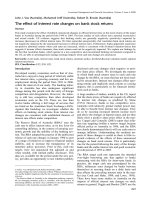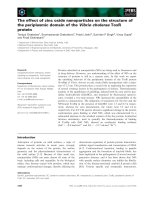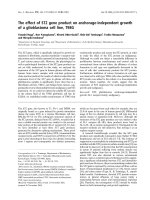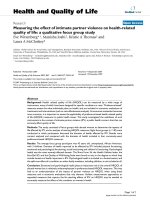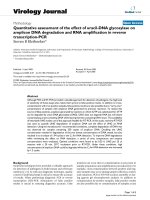ionescu - 2014 - the effect of mandatory partner rotation on audit quality [mapr]
Bạn đang xem bản rút gọn của tài liệu. Xem và tải ngay bản đầy đủ của tài liệu tại đây (145.33 KB, 7 trang )
124
Economics, Management, and Financial Markets
Volume 9(1), 2014, pp. 124–129, ISSN 1842-3191
THE EFFECT OF MANDATORY PARTNER ROTATION
ON AUDIT QUALITY
LUMINIŢA IONESCU
Spiru Haret University
ABSTRACT. The theory that I shall seek to elaborate here puts considerable emphasis
on possible consequences of mandatory auditor rotation, the effect of auditor tenure
on audit quality, and the pros and cons of mandatory rotation. Related topics I will
explore include mechanisms that facilitate audit partner rotation, the consequences
of mandatory partner rotation, and the impact of mandatory partner rotation on audit
quality.
JEL Codes: H83; M4
Keywords: audit partner rotation; mandatory; quality; firm
1. Introduction
I am specifically interested in how previous research investigated the potential
erosion of client-specific and industry knowledge resulting from mandatory
audit partner rotation, the desirability of mandatory rotation, and the associ-
ation between earnings quality and auditor rotation. The mainstay of the
paper is formed by an analysis of the association between both audit firm and
partner tenure and audit quality, the consequences of mandatory audit firm
rotation, the potential benefits of audit firm rotation using mandatory rotators
data, and mandatory rotation as a way to promote a more independent auditor-
client relationship.
2. Mechanisms that Facilitate Audit Partner Rotation
Holding audit quality constant, mandatory rotation does not directly affect
the quality of the client’s pre-audit financial statements. A change of partner
may worsen audit quality (partners may gain more knowledge from longer
tenure with the client), whereas a change of audit partner may improve audit
quality by bringing a fresh perspective to an audit. Mandatory rotation can
125
improve audit quality in the year before rotation occurs and in the year of
appointment of the new partner. Audit reports in China (Popescu, 2013d)
disclose the names of the engagement and review partners. The review part-
ner and the engagement partner share the same legal liability (unless there is
contrary evidence) and are subject to the same rules on mandatory rotation
(audit firms in China are allowed to organize as limited liability companies
or as partnerships). The rules in China allow for simultaneous rotation of
both the engagement partner and the review partner. Auditors are required to
judge whether a misstatement is material by considering both its quantitative
magnitude and any relevant qualitative factors. Audit adjustments occur more
often when the engagement partner is scheduled for mandatory rotation at
the end of the year, and during the incoming partner’s first year of tenure
than in other years. A newly appointed partner is more likely to detect and
correct financial reporting problems (Popescu, 2013c) during his first year of
tenure. Mandatory partner rotation has a beneficial effect in the final year of
tenure before rotation occurs and in the subsequent year when the new
partner is appointed. The higher frequency of audit adjustments surrounding
partner rotation is not attributable to differences of judgment between the
departing partner and the new partner. Mandatory partner rotation has a ben-
eficial impact on audit quality even in the absence of mandatory audit firm
rotation, can have a positive impact on audit quality, and significantly in-
creases the frequency of audit adjustments. The positive association between
audit firm tenure and audit quality can reflect the underlying factors that cause
voluntary switches. (Lennox, Wu, and Zhang, 2014)
Increased client-specific knowledge provides a comparative advantage in
detecting material misstatements in financial reports. Individual auditors store
information about the client in memory and the audit firm stores information
about the client in audit work papers. The CLERP 9 regulatory changes on
mandatory audit partner rotation have been effective in improving audit qual-
ity. Auditors tend to issue going-concern opinions for financially distressed
companies (Nicolăescu, 2012) when audit partner tenure is equal to or more
than the mandated period. There is a significant and positive association
between long audit partner tenure and the likelihood of issuing a going-
concern opinion for a financially distressed company. (Monroe and Hossain,
2013) Audit firm rotation automatically implies audit partner rotation, unless
the lead audit partner and the client move together to another audit firm.
Turnovers of auditors within the audit firm unlikely affect the economic
incentives (Nicolăescu, 2013c) of the audit firm with respect to the client. A
rotation of the audit firm automatically implicates that a new audit partner
will be responsible for the client. Mandating audit firm rotation might have a
positive effect on the asymmetric timeliness of loss recognition (i.e. conser-
126
vatism). Conservatism is an important attribute of earnings quality. (Kramer
et al., 2011)
3. The Consequences of Mandatory Partner Rotation
Audit quality is higher during the engagement partner’s final year of tenure
prior to mandatory rotation and during the engagement partner’s first year of
tenure following mandatory rotation. Audit adjustments occur more frequently
when the engagement partner is in his final year of tenure prior to mandatory
rotation. The fresh eyes effect is limited to the engagement partner’s first
year of tenure and does not extend to the second year. Larger companies and
companies with higher leverage are less likely to require audit adjustments,
whereas audit adjustments occur more often when ownership structures are
more complex. Audit adjustments occur more often in the years surrounding
audit partner rotation. The mandatory rotation of engagement partners is
associated with more frequent large adjustments and more frequent small
adjustments (Nica, 2012), mandatory rotation helping engagement partners to
detect and correct both quantitatively small and quantitatively large misstate-
ments. Auditors are more likely to require profits to be adjusted downwards
rather than upwards. Engagement partners require more upward adjustments
and more downward adjustments in their final years of tenure prior to man-
datory rotation, and work harder to detect and correct financial reporting
problems during their final years of tenure. New engagement partners bring a
fresh perspective to the audit, being more likely to detect overstatements and
understatements of profits. (Lennox, Wu, and Zhang, 2014)
Auditing firms likely recognize the benefits of periodic engagement per-
sonnel rotation. Audit partners of larger firms are more likely to believe
rotation negatively impacts audit quality. Smaller firms may have fewer clients
subject to the rotation rules (Popescu, 2013b) as a percentage of their entire
practice. Smaller auditing firms may have been disproportionately negatively
impacted by SOX mandates. Accelerated rotation may have more negative
impacts on smaller firms with fewer resources. (Daugherty, Dickins, and
Higgs, 2011) Politically connected firms may be reluctant to appoint Big Four
auditors to improve accounting transparency. Political connections can add
value to all shareholders, and engender agency conflicts between dominant
insiders and outside investors. Minority investors become more susceptible
to expropriation as the ownership-control gap widens. Firms with a single
large shareholder suffer worse agency conflicts with outside investors. Large
shareholders in business groups (Nica, 2013) can exploit pyramidal ownership
to secure control rights that far exceed their equity stakes. The separation of
cash flow rights from voting rights in firms affiliated with a business group
127
(Nicolăescu, 2013a) magnifies agency costs. Exploiting connections to orches-
trate the diversion of corporate resources requires hiding. (Guedhami, Pittman,
and Saffar, 2014)
4. The Impact of Mandatory Partner Rotation on Audit Quality
Audit adjustments occur more often in the engagement partner’s first year of
tenure following mandatory partner rotation. Voluntary rotations are much
more common than mandatory rotations. Engagement partners and review
partners are less likely to be voluntarily rotated off the audit after they make
adjustments to the client’s pre-audit profits, an audit firm preferring partner
continuity when a client is found to have financial reporting problems requir-
ing audit adjustments. One cannot draw valid inferences about mandatory
rotation by examining situations in which partners are rotated voluntarily.
Audit adjustments are significantly more frequent in the first year of tenure
following mandatory partner rotation, and are less frequent in the first year
of tenure following voluntary rotation. Mandatory rotation results in higher
audit quality. A newly appointed engagement partner tends to require adjust-
ments during his first year of tenure following mandatory rotation. Mandatory
partner rotation can be beneficial in terms of increasing the frequency with
which partners detect and do not waive adjustments, and occurs relatively
infrequently, while audit firm tenure is typically quite long. (Lennox, Wu,
and Zhang, 2014) Policy makers recognize explicitly the difference between
voluntary and mandatory auditor changes. (Casterella and Johnston, 2014)
Option backdating possesses two basic features of accounting fraud – in-
centive and opportunity. Compensation expenses need to be disclosed in the
footnotes of financial reports (Popescu, 2013e) and audited by independent
external auditors. Audit tenure is the length of the auditor-client relationship
(Nicolăescu, 2013b) as of the fiscal year-end in the financial statements.
Longer audit tenure is positively associated with the likelihood of option
backdating, whereas the positive effect is more pronounced when the audit
tenure is longer than ten years. Firms with larger stock return volatility
(Popescu, 2013a) are more likely to backdate their stock options. Long audit
tenure is positively associated with the likelihood of stock option backdating,
a form of accounting fraud. The detrimental effect of long audit tenure is
more pronounced in larger audit clients. (Ouyang and Wan, 2013)
Mandatory audit partner rotation interrupts the accumulation of audit part-
ners’ industry-specific knowledge and expertise. An audit partner’s within-
industry market share is a less reliable proxy for audit partner industry exper-
tise under the mandatory audit partner rotation regime. The audit partner’s
within-industry market share reliably captures audit partner industry expertise
in the voluntary partner rotation regime. Mandatory audit partner rotation
128
has decoupled the link between the audit partner’s within-industry market
share and audit partner industry expertise. Mandatory partner rotation forces
changes in the market shares of incoming and departing partners. The audit
partner’s within-industry market share is artificially increased or decreased
by mandatory rotation. Audit quality is no longer positively associated with
the audit partner’s within-industry market share. In the voluntary partner
rotation regime, auditors who are industry experts at both the firm and part-
ner levels enhance audit quality. Mandatory audit partner rotation artificially
increases or decreases an auditor’s within-industry market share (Nicolăescu,
2013d), and makes an auditor’s within-industry market share a noisy proxy
for auditor industry expertise. Audit quality is positively related to auditor
industry expertise proxied by the auditor’s within-industry market share in
the voluntary audit partner rotation regime (an audit partner’s market share
in an industry is determined by the free choice of the market). (Wuchun,
Hsiumei, and Hong, 2014)
5. Conclusions
The paper generates insights about the associated costs and benefits of man-
datory audit firm rotation, the effect that mandatory rotation may have on
auditor independence and audit quality, and the concept of mandatory auditor
rotation. My paper contributes to the literature by providing evidence on the
role of auditor industry expertise on audit quality, the impact of the duration
of auditor-client relationships on audit quality, and the effects of audit part-
ner rotation on audit quality.
REFERENCES
Casterella, Jeffrey R., and Derek Johnston (2014), “Can the Academic Literature
Contribute to the Debate Over Mandatory Audit Firm Rotation?” Research in
Accounting Regulation 25(1): 108–116.
Daugherty, Brian, Denise Dickins, and Julia Higgs (2011), “Reducing the Potential
Negative Effects of Mandatory Partner Rotation,” The CPA Journal August: 60–
63.
Guedhami, Omrane, Jeffrey A. Pittman, and Walid Saffar (2014), “Auditor Choice in
Politically Connected Firms,” Journal of Accounting Research 52(1): 107–162.
Kramer, Stefan Thomas, Georgios Georgakopoulos, Ioannis Sotiropoulos, and Kon-
stantinos Z. Vasileiou (2011), “Audit Firm Rotation, Audit Firm Tenure and
Earnings Conservatism,” International Journal of Business and Management
6(8): 44–57.
Lennox, Clive, Xi Wu, and Tianyu Zhang (2014), “Does Mandatory Rotation of
Audit Partners Improve Audit Quality?” The Accounting Review 89. Forthcoming
129
Monroe, Gary, and Sarowar Hossain (2013), “Does Audit Quality Improve after the
Implementation of Mandatory Audit Partner Rotation?” Accounting and Manage-
ment Information Systems 12(2): 263–279.
Nica, Elvira (2013), “Organizational Culture in the Public Sector,” Economics,
Management, and Financial Markets 8(2): 179–184.
Nica, Elvira (2012), “Driving Forces for the Professionalisation of Human Resource
Management in Europe,” Economics, Management, and Financial Markets 7(4):
134–139.
Nicolăescu, Eugen (2013a), “Developments in Corporate Governance and Regulatory
Interest in Protecting Audit Quality,” Economics, Management, and Financial
Markets 8(2): 198–203.
Nicolăescu, Eugen (2013b), “Understanding Risk Factors for Weaknesses in Internal
Controls over Financial Reporting,” Journal of Self-Governance and Management
Economics 1(3): 38–43.
Nicolăescu, Eugen (2013c), “Business Ethics, Corporate Governance, and Social
Responsibility,” Journal of Self-Governance and Management Economics 1(1):
86–92.
Nicolăescu, Eugen (2013d), “The Need for Effective Internal Audit as Part of Good
Corporate Governance Practices,” Psychosociological Issues in Human Resource
Management 1(1): 108–113.
Nicolăescu, Eugen (2012), “The Mechanisms of Corporate Governance and Their
Empirical Relation to Firm Performance,” Economics, Management, and Finan-
cial Markets 7(4): 203–208.
Ouyang, Bo, and Huishan Wan (2013), “Does Audit Tenure Impair Auditor Inde-
pendence? Evidence from Option Backdating Scandals,” International Journal
of Business and Social Science 4(14): 23–33.
Popescu, Gheorghe H. (2013a), “Partisan Differences in Evaluations of the Economy,”
Economics, Management, and Financial Markets 8(1): 130–135.
Popescu, Gheorghe H. (2013b), “Macroeconomic Policies in the Eurozone,” Econ-
omics, Management, and Financial Markets 8(2): 185–191.
Popescu, Gheorghe H. (2013c), “The Growing Weight of the BRICS in the Global
Economy,” Journal of Self-Governance and Management Economics 1(2): 48–53.
Popescu, Gheorghe H. (2013d), “The Social Evolution of China’s Economic Growth,”
Contemporary Readings in Law and Social Justice 5(1): 88–93.
Popescu, Gheorghe H. (2013e), “Macroeconomics, Effective Leadership, and the
Global Business Environment,” Contemporary Readings in Law and Social Justice
5(2): 170–176.
Wuchun, Chi, Liao Hsiumei, and Xie Hong (2014), “Does an Auditor’s Within-
Industry Market Share Still Capture Auditor Industry Expertise in a Mandatory
Audit Partner Rotation Regime?” Journal of Modern Accounting and Auditing
10(1): 80–96.
Reproduced with permission of the copyright owner. Further reproduction prohibited without
permission.


